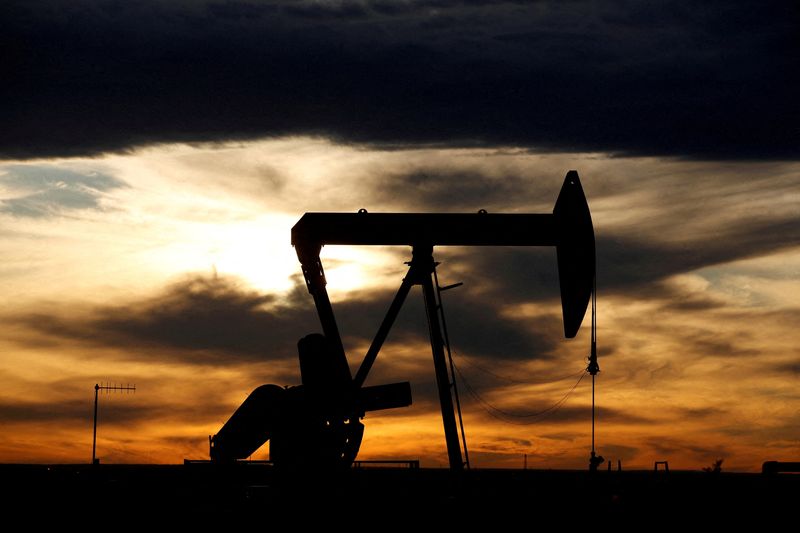By Shariq Khan and Nicole Jao
NEW YORK (Reuters) – U.S. President-elect Donald Trump’s pledge to impose tariffs on Canada would drive up fuel prices for Americans as it would upend decades-old oil trade from its top crude supplier, analysts said on Wednesday.
Trump, who takes office on Jan. 20, said this week he would impose a 25% tariff on all imports from Canada and Mexico until they clamp down on drugs and migrants crossing the border. Canadian oil imports would not be exempt under a free-trade deal from the levies, Reuters reported.
Even as surging oil output to record highs has made the U.S. the world’s largest producer in recent years, more than a fifth of the oil processed by U.S. refiners is imported from Canada.
In the landlocked U.S. Midwest, where refineries process 70% of the more than 4 million barrels per day (bpd) of Canadian crude imports, consumers could see pump prices jump by 30 cents per gallon or more, or about 10%, based on current prices, GasBuddy analyst Patrick De Haan said.
If implemented, the tariffs would force those refiners, including Marathon Petroleum (NYSE:MPC), BP (NYSE:BP), and Phillips 66 (NYSE:PSX), to either pay a higher price to import oil from these countries or to find alternative suppliers that would be further away and thus also more expensive.
In either scenario, a portion of the added costs is likely to be passed on to U.S. consumers in the form of higher prices for gasoline at retail pumps, Commodity Context analyst Rory Johnston said.
“Any tariffs on Canadian oil are going to increase pump prices given the dependence of much of the U.S. refining industry on Canadian crude,” Johnston said. The cost of crude feedstock is the biggest component of retail gasoline prices.
BP, Marathon, and Phillips 66 did not immediately respond to requests for comment.
America’s top oil trade groups, the American Fuel and Petrochemical Manufacturers group and the American Petroleum Institute, meanwhile, said imposing the tariffs would be a mistake – exposing a rare moment of discord between the industry and Trump.
“Across-the-board trade policies that could inflate the cost of imports, reduce accessible supplies of oil feedstocks and products, or provoke retaliatory tariffs have potential to impact consumers and undercut our advantage as the world’s leading maker of liquid fuels,” AFPM said on Tuesday.
Cheaper gasoline was among Trump’s top priorities during his re-election campaign as he sought to connect with consumers frustrated by sky-high fuel prices in the aftermath of the coronavirus pandemic, Russia’s invasion of Ukraine, the war in Gaza and other supply disruptions.
Gasoline prices jumped to over $5 per gallon in 2022, but have fallen sharply since, hitting $3.04 as of Monday, the lowest since 2020, the U.S. Energy Information Administration said.
MIDWEST TO BE HIT HARDEST
Many of the country’s refineries are configured to process heavy Canadian crude grades, and not the light grade pumped in the booming U.S. shale oilfields.
U.S. Midwest refineries, in particular, are geared to run the heavier crude shipped across the border by pipeline or rail.
BP’s Whiting refinery in Indiana, the largest fuel supplier in the Midwest, imported more than 250,000 bpd of Canadian heavy oil in 2023, or about 57% of its 440,000 bpd refining capacity, according to RBN Energy.
Other U.S. states will also feel the pinch, albeit to a smaller extent, GasBuddy’s De Haan said.
Major consumer markets on the U.S. East Coast can tap seaborne cargoes from Europe or Africa if tariffs threaten their purchases of gasoline from the Irving Oil refinery in Saint John, New Brunswick (NYSE:BC), he said.
Irving Oil did not immediately respond to a request for comment.
West Coast refiners are better geared to process U.S. crude, he added.
“States that border Illinois are the areas that would be most impacted because they have the fewest alternatives,” De Haan said.
Gulf Coast refiners have some capacity to import more oil from members of the Organization of the Petroleum Exporting Countries such as Iraq, Saudi Arabia, Kuwait and Venezuela, Commodity Context’s Johnston said.
Across the board, many refiners are already facing significantly lower margins for producing fuel, hitting their profits in recent quarters.
“These potential tariffs are a kick in the teeth for refineries,” De Haan warned.

































